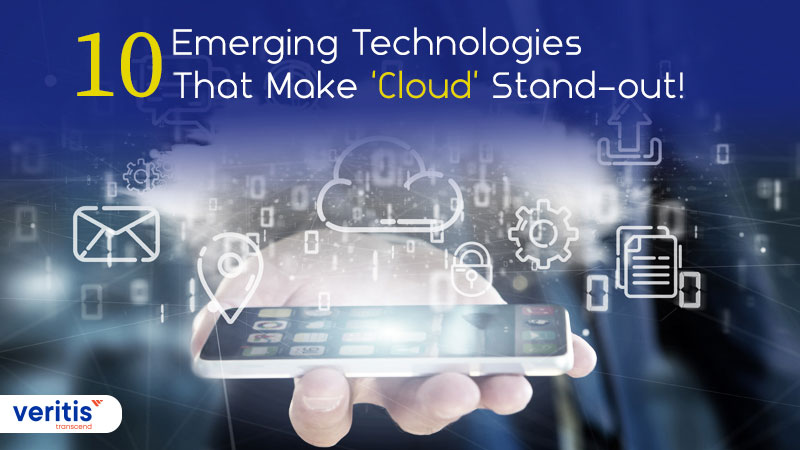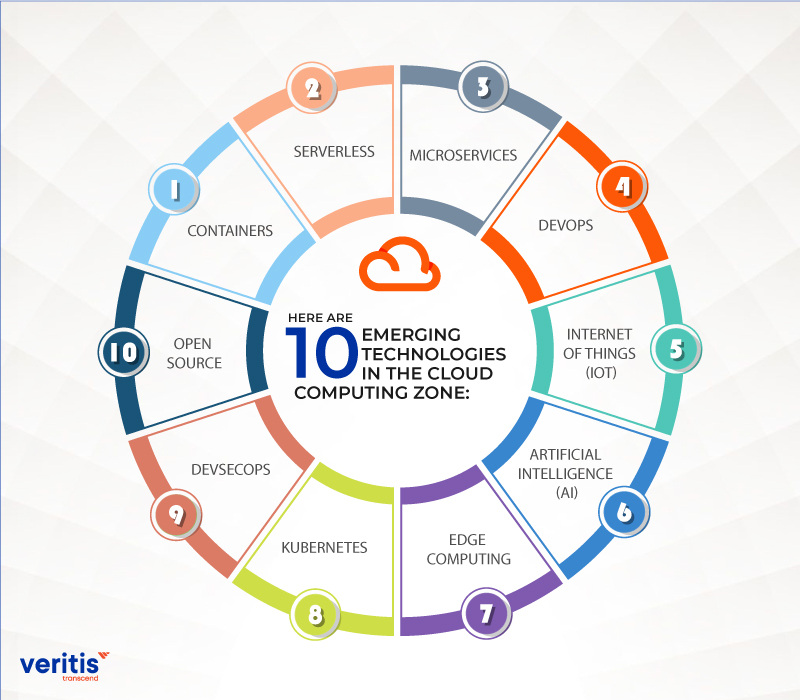
Technology has come a long way in transforming the industry. Cloud computing services are one major revolution in the process that has completely changed the way business functions. And we have been witnessing a series of emerging technologies powered by security in cloud computing networks.
The technology evolution has been happening around cloud platform solutions and effective cloud technology utilization. In the process, these technologies are not just changing the cloud computing environment but transforming the computing world.
In some cases, cloud firms have developed these innovative technologies, including serverless ones, particularly for cloud network technology. In some instances, technology has improved due to its direct connection to the cloud technologies, such as machine learning and artificial intelligence.
The cloud computing model has become a crucial business tool for storing and sharing data. The pandemic accelerated its adoption as remote work became prevalent. Cloud computing trends are prominent in application and infrastructure software, business processes, and system infrastructure.
Market.us forecasts worldwide cloud computing will surpass USD 2,321.1 billion by 2032, undergoing a compound annual growth rate (CAGR) of 16% from 2023 to 2032. Gartner predicts growth across all segments of the cloud market in 2023. Infrastructure-as-a-service (IaaS) is anticipated to lead with the highest end-user spending growth at 30.9%, followed by platform-as-a-service (PaaS) at 24.1%.
In either case, these cutting-edge technologies are transforming not only the cloud computing service models but also enterprise computing as a whole, not to mention industries such as media, retail, and pharmaceuticals.
Gartner’s projection for 2026 indicates that 75% of organizations will embrace a digital transformation model centered on the cloud as the core foundation. Although cloud infrastructure and platform services are leading in spending growth, the Software as a Service (SaaS) sector maintains its position as the largest segment in terms of end-user spending. SaaS spending will rise by 17.9% to reach USD 197 billion in 2023.
These new technologies, either cloud based applications or very compatible with the cloud, hold great potential but have also added to the complexity of cloud computing infrastructure. Here are 10 emerging technologies in the cloud network technology security zone:
Here are 10 Emerging Technologies in the Cloud Computing Zone:

1) Containers
Containers rose to fame precisely when the ‘speed of delivery and complexity’ has been essential for the IT industry. Unlike traditional Virtual Machines (VM) that hold the main OS, Container technology arrived as a lightweight software packaging method, where a container package carries a piece of software and its bare essentials (libraries and configuration files) to traverse across different private cloud computing infrastructure environments.
Containers are collections of software that include all the required components to virtualize the operating system and enable it to run anywhere. It can be done on a developer’s laptop or from a private data center to a public cloud. Google runs everything in containers, from Gmail to YouTube to Search. The containerization technology enables the development teams to work at an unprecedented scale, deploy software efficiently, and move quickly.
Docker and Kubernetes took the container popularity to the next level regarding adoption.
Useful Link: Serverless Vs Containers: Comparison Between Top Two Cloud Services
2) Serverless
That was when the IT industry struggled with critical hardware maintenance and software provisioning. Serverless computing answered these concerns by handling firms’ critical maintenance and scaling demands, encouraging them to focus on other vital functions in their cloud service provider systems.
With serverless computing, the trend for pay-as-you-go and pay-for-use computing models picked up, addressing most software burdens. This function-as-service model made the cloud infrastructure solutions run faster and more efficiently.
Cloud computing infrastructure execution model known as “serverless” offloads to cloud service providers and tools all responsibility for routine infrastructure management activities such as scaling, scheduling, patching, provisioning, etc. Additionally, it enables engineers to concentrate their time and energy on the particular business logic for their apps or processes. They don’t need any infrastructure for management or operation. They make it possible for end users to only ever pay for utilized resources.
3) Microservices
Dealing with single large applications is old-fashioned! Componentization has been the trend to simplify the software process. This process of breaking a more extensive application into small modules or components to deliver faster is called Microservice.
A microservice architecture breaks monolithic apps into small, joined services or modules. This modular approach makes delivering multiple modules by different small teams easy, independent of the actual ‘bulk’ application. This enables continuous delivery of fully-updated software and ultimately speeds up the app delivery cycle.
4) DevOps
This is another major trend that gave a due boost to virtualization in the cloud computing infrastructure environment. By bridging gaps, the DevOps culture brought together teams with expertise in different areas, making them work for a single goal.
Developers create codes; Operations teams work on metrics. Together, they can create wonders in a software environment giving a competitive edge for organizations. DevOps tools and resources, security integration like DevSecOps and more make DevOps more special!
5) Internet of Things (IoT)
IoT has given a new shape to the technology trend. We see the resultant fitness trackers that come as wristwatches, smart homes, self-driving automobiles, and more. These processes involve enormous volumes of data. So, how do you process this data? The answer many businesses have is through the ‘Cloud’.
Cloud-based data analytics platforms, backed by hyper-scaling servers, facilitate effective data processing. Cloud service providers also offer a solution to another critical question about setting up IoT, which is expensive and complex to build from scratch.
No worries, major cloud platform solutions address this concern by giving IoT solutions as part of their offering.
6) Artificial Intelligence (AI)
Artificial Intelligence is now the next-generation technology solution set to present the technology world in a different view. With its solutions that exhibit machine intelligence independent of human assistance, AI is emerging to enjoy high market dominance among existing tools.
However, building AI applications is complex for many businesses. This is where the cloud has a crucial role. Such companies are looking at Cloud platform solutions for machine learning and other deep learning tools. Because of its vast computing and storage options, cloud-based AI is emerging as the most sought-after solution for businesses of any size in realizing their AI efforts.
Cloud computing applications are intricately linked with Artificial Intelligence (AI) and Machine Learning (ML). These services offer cost-effective solutions, as they require substantial computational power and storage for data collection and algorithm training. They address the challenge of handling vast data volumes, ultimately enhancing productivity in the tech industry. Anticipated trends in this field encompass heightened automation and self-learning capabilities, enhanced data security and privacy measures, and the delivery of more personalized cloud experiences.
7) Edge Computing
Edge computing represents a cloud network optimization technique that focuses on processing data closer to its source, enhancing real-time functionality on cloud server infrastructure, and storing less time-sensitive data for long-term purposes.
With the ongoing convergence of telecom and IT industries, edge computing is poised to take center stage, opening up numerous opportunities and cloud based applications for organizations.
The growing proliferation of IoT devices further underscores the significance of edge computing, as it plays a vital role in enabling real-time data analysis and information delivery while efficiently managing traffic flow from each IoT device.
Useful Link: Edge Computing Vs Cloud Computing: What are the Key Differences?
8) Kubernetes
A notable trend is the increasing use of container orchestration platforms like Kubernetes and Docker. These technologies facilitate large-scale deployments known for their exceptional scalability and efficiency. Kubernetes, an extensible open-source platform, allows applications to run from a single source while efficiently managing services and workloads centrally. The evolution of Kubernetes is rapid, and it will remain a significant contributor to upcoming cloud computing trends in the coming years.
9) DevSecOps
Cloud computing applications offer users a user-friendly experience for data management, but it also presents various security challenges. Security risks in cloud computing include unauthorized intrusion, service denial attacks, network eavesdropping, virtualization vulnerabilities, cloud service misuse, and side-channel attacks.
Today, businesses often view data security in cloud computing history as a significant hurdle, deterring them from embracing cloud platform solutions. This is where DevSecOps steps in. DevSecOps entails integrating infrastructure security right from the outset. It emphasizes automating core security tasks by embedding controls and processes within its workflow.
Cloud computing future heavily depends on ensuring clients and users operate within a secure system, and DevSecOps represents the most effective approach to achieving comprehensive security.
10) Open Source
The IT industry is undergoing a significant shift towards increased collaboration and innovation. This transformation is poised to reshape how enterprises approach the management of cloud services, leading them to explore the adoption of open-source cloud services. Open-source cloud services encompass cloud infrastructure solutions built using technology or software that is open for customization by anyone. Essentially, open-source cloud platforms offer enterprises the flexibility to tailor their infrastructure to their specific requirements.
Opting for an open-source tech platform presents several advantages for businesses. It enables rapid scalability of cloud server infrastructure, facilitating the seamless addition of features compared to closed-source alternatives. Additionally, open-source platforms tend to raise fewer security concerns. As previously mentioned, the industry is progressing towards a collaborative environment. Choosing an open-source cloud computing platform represents a strategic move for enterprises seeking scalability and adaptability.
The cloud computing model is one of the most promising career paths today, and it is expected to remain at the forefront of IT cloud solutions disruptions and the integration of new technologies for the foreseeable future.
Conclusion
Technology has been advancing and influencing our lives since industrialization and even before that. The technologies above are essential to developing and using robotics, chatbots, and many other tasks, including realizing Human Intelligence. Investing in these top 10 developing technologies right now will strengthen your company, give you a sense of security, and give you a blueprint for the future of cloud computing.
These promising technologies show again how crucial cloud computing service providers are to the IT industry today and for the future of cloud computing for business. Cloud Computing trends play a vital role in the current IT era. Cloud technology could transform the business, but judgments about platform selection, adoption strategy, and cost modeling can be complex without assistance. This is where Veritis steps in. Veritis, the Stevie Award, and Globbe Business Awards winner, provides top-notch and robust solutions for all your unique requirements with a cost-effective solution.
Enhance Our Cloud Services Got Questions? Schedule A Call
[WPSM_AC id=13646]
Additional Resources:
- 10 Ways Artificial intelligence (AI) is Transforming DevOps
- Top 15 AWS Machine Learning Tools in the Cloud
- 6 Ways AIOps Optimizes Cloud Security
- Amazon Aurora Vs Amazon RDS Comparison
- MongoDB Vs RDBMS: Comparing the Big 2 Database Services
- Serverless Vs Containers: Comparison Between Top Two Cloud Services
- Which Cloud has Better Private Connectivity: AWS or Azure or GCP?